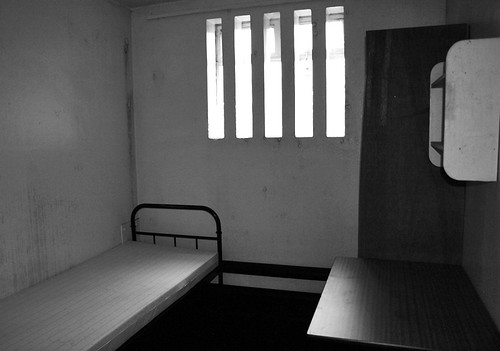Originally written for a competition by the Howard League for Penal Reform for essays on the topic of “Why Prisons Don’t Work”. You can read the winning (and excellent) essays here.

It is often said “prison works”. It is less often said what it means for a prison to “work”. Traditionally prisons have been argued to serve at least one of three functions: to punish the prisoner, to protect the public, and to rehabilitate the offender to prevent them committing another crime. However, on closer inspection, the reasons given seem to have secondary important to the need for society to feel like something is being done, that justice is being served, that law and order is being kept, with near-total disregard for those who find themselves shut out of society with no hope of redemption.
The first function given for prison, punishment, has always seemed to have the least force. Setting aside the dubious civility of a society which seeks revenge upon its citizenry, is spending £30,000 a year on keeping someone in prison when most prisoners really hurting them, or us? (1) Rehabilitation, a far more worthy aim, is chronically underfunded and ultimately useless in a system which is often referred to as a “university of crime”, where young impressionable offenders quickly pick up new skills from veteran prisoners and criminals and escalate their offences when they are released. Which leaves the protection of the public as the remaining reason, and the reason that prisons came about in the first place. Imprisoning those who threaten others seems slightly more justifiable. But this has to be balanced with the human rights of those convicted of crimes themselves – can we justify the imprisonment of such people? Does our society ultimately benefit from keeping people away under lock and key?
In 1993, the psychologist Terrie Moffett published a paper in the Psychological Review that argued that there were two fundamental types of prisoner – the adolescent-limited and the lifelong-persistent. The adolescent-limited are young, primarily men, who commit crime to support themselves, for fun, as part of a gang, or other reasons, who eventually mature, settle down and give up the lifestyle that was contributing to their criminality. The second type, lifelong-persistent, are people who commit crimes casually and often, moving through the criminal justice system in a perpetual cycle of crime-arrest-conviction-incarceration-release-crime and rarely, if ever, breaking out of that cycle. There are a variety of reasons both types end up in prison, including poor education, drug addiction, racism (young black men are twice as likely to go to prison than to university. (2)) and mental health difficulties, which are again rarely, if ever, given the attention they deserve.

Neither type of prisoner are prevented from committing more crime or given the chance to change their lives through serving prison sentences. The adolescent-limited, young and not really thinking about the consequences of their actions, find themselves permanently disadvantaged for the rest of their lives; upon release from prison, they struggle to find housing, meaningful employment and integration into society. It becomes easier to continue to commit more crimes to support themselves. Some will settle down and find councils and employers to give them a chance in life, but their potential, especially the potential of young black men, is severely compromised by serving a prison sentence, a physical block to their life’s progress as well as a permanent addition to their CV. Likewise, the lifelong-persistent are let down by our society. To deal with the reasons for people returning to prison over and over again, we require drug treatment programmes, mental health treatment, adult education, housing programmes, and ways of giving people pride and hope in themselves. But, when regarding that list, how much of it can be achieved effectively in a prison?
However, the rhetoric of the redtops of this country considers such proposals merely “pampering criminals”. Their attitude is largely that prison is for punishing people that society disapproves of. But if by prison “working”, we mean “reduces crime”, the only crime reduced is that which the imprisoned would have committed while doing time – as mentioned earlier, the recidivism rate for people who have been to prison more than twice is nearly 70%, so clearly prison does not “teach people a lesson”. But most advocates of prison do not care about that: they want to “see justice served” as opposed to actually seeing crime reduced and those who commit crime changing their lives. Jon Venables and Robert Thompson were both locked up for ten years – one has now been rehabilitated and is trying to build a new life, one has gone back into prison for breaking his parole. The press wants to see them both imprisoned at great cost to the taxpayer regardless of their current circumstances, and with the broad support of their readers, it seems. With such calls, can we really say society cares about whether prison works or not?

Ultimately, the way we treat prisoners as a society reflect on our humanity. Dostoevsky famously wrote “The degree of civilization in a society can be judged by entering its prisons.” However, it is also the mark of a functional, thriving society that its citizens feel safe and protected from those who would do them harm. People who kill, rape, steal, assault and engage in other anti-social behaviour are causing us as individuals and as a community harm and need to be dealt with. We need evidence-based solutions to tackle the problems that leads people to commit crime. But is prison really effective at this? Can prison deal with poverty, drug addiction, racism, patriarchy, social breakdown, senses of insecurity, resentment, or entitlement? Unlikely. Perhaps prisons “work” to give us a sense of satisfaction that something has been done – but do prisons “work” to create a safer, more secure society that protects its citizens, prevents crime, and rehabilitates those citizens who find themselves on the wrong side of the law? The evidence would suggest that as a society we have got our definition very wrong.
(1) Kanazawa, Satishi (24th August, 2008), “When crime rates go down, recidivism rates go up”, Psychology Today. Accessed 19th April, 2010.
(2) Smart Justice (2004), “The Racial Justice Gap: Race and the Prison Population Briefing”, pg 2.
Visit the Howard League for Penal Reform.
“People who kill, rape, steal, assault and engage in other anti-social behaviour are causing us as individuals and as a community harm and need to be dealt with.”
Society itself is guilty of all these crime-actions. You are missing the three most fundamental points :
1. Crime as a concept does not make rational sense.
2. Society has no right to interfere in the criminal acts of any criminal because it created the criminal and commits more crime-acts than any criminal ever possibly could.
3. Society chooses to deliberately sponsor and promote the causes of crime.
Visit MY website Forbidden Truth Media for the Truth on society, crime and humanity.
While you may have a point regarding points 1 and 3, refusing to deal with violent acts at all is quite stupid. Even the most committed anarchists I know, who believe that “crime”is largely a tool of social control, admit that something has to be done about people who are a danger to themselves and others (they usually advocate a form of house arrest, I don’t know what you make of that).
I have looked at your website, and while I am intrigued by your ideas, your argument on crime seems to be that criminals shouldn’t be punished because society commits the same actions all the time. However, your entire website is devoted to condemning the actions of society in this regard. What is the difference between an act of violence perpetrated on the individual by the state, and an act of violence perpetrated on the individual by an individual? There is none.
Sarah has a good point but how can we end crime? We cant, but reduce the amount by treating people who are drug abusers like addict and not someone who rapes steal and kills. But we also forget that rehab would most likely cost more then prison and to do it on a massive level would just be impossible and if the rehab does’t work tons of money would be lost and again on a small scale it work but the real question is Can rehab work on a massive scale?
Hi Wolf,
residential rehab programmes cost about half of what imprisonment costs per week. Don’t forget also that a lot of people would benefit from heroin and cocaine prescription programmes, which cost 15% of the cost of imprisonment.
Somewhere in the region of 80% of all burglaries are committed to support drug habits. Imagine what would happen to crime if we just gave all of the people who commit acquisitive crime the drugs they were after for free. Actually, in Holland, where as soon as you admit you’ve got a problem they put you on a prescription for life, the average age of a heroin user has now risen from 25 to 36. Relatively few people are getting into heroin because there’s no incentive for anyone to start dealing it and lots of help getting off it if you want to.
So rehab can definitely work on a large scale – but in terms of wider crime, there is a significant link between educational attainment and petty crime, as well as the availability of job opportunities. If we sorted those out as a society, most of our prisons would simply be unnecessary.
You’ll find one of the big advantages of a copper bottom cookware set the moment you
start extracting your brand new pans and pots from the box.
It can make terrific and instant meals for breakfast, lunch
and dinner, and is perfect for traveling, excursions, and parties.
* Practice simple recipes at first to get used to the difference
in heat.
what do you mean by is spending £30,000 a year on keeping someone in prison when most prisoners really hurting them, or us?
The average worker in the UK earns £22k a year. Say they lose approximately half that income in taxation. Keeping someone in prison effectively uses up the taxed productivity of three average taxpayers and that’s just hard money, not even considering the social damage done (ie taking parents away from children, being unable to obtain work because of a criminal record etc the damage done to the mental health of prisoners by being in prison) – a significant portion of the taxed earnings of our entire workforce goes towards maintaining this system that is actively harming the social fabric of our country. This is ridiculous.